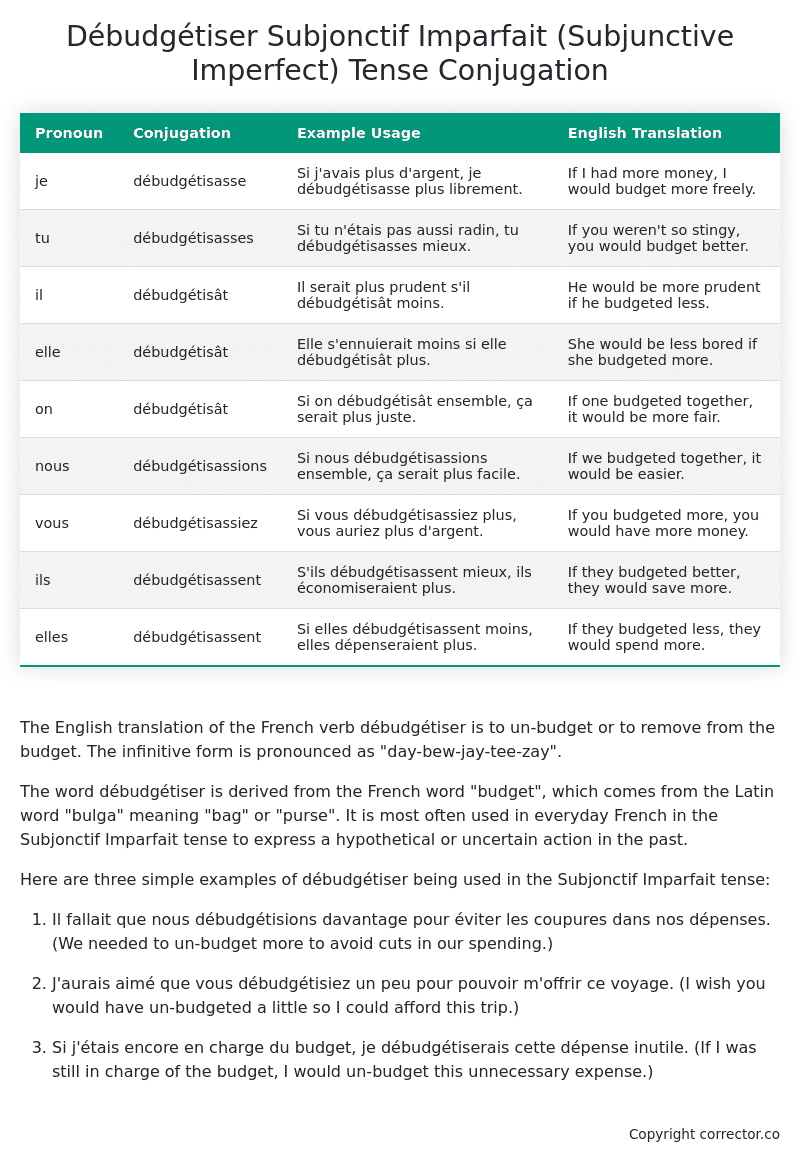Subjonctif Imparfait (Subjunctive Imperfect) Tense Conjugation of the French Verb débudgétiser
Introduction to the verb débudgétiser
The English translation of the French verb débudgétiser is to un-budget or to remove from the budget. The infinitive form is pronounced as “day-bew-jay-tee-zay”.
The word débudgétiser is derived from the French word “budget”, which comes from the Latin word “bulga” meaning “bag” or “purse”. It is most often used in everyday French in the Subjonctif Imparfait tense to express a hypothetical or uncertain action in the past.
Here are three simple examples of débudgétiser being used in the Subjonctif Imparfait tense:
-
Il fallait que nous débudgétisions davantage pour éviter les coupures dans nos dépenses. (We needed to un-budget more to avoid cuts in our spending.)
-
J’aurais aimé que vous débudgétisiez un peu pour pouvoir m’offrir ce voyage. (I wish you would have un-budgeted a little so I could afford this trip.)
-
Si j’étais encore en charge du budget, je débudgétiserais cette dépense inutile. (If I was still in charge of the budget, I would un-budget this unnecessary expense.)
Table of the Subjonctif Imparfait (Subjunctive Imperfect) Tense Conjugation of débudgétiser
| Pronoun | Conjugation | Example Usage | English Translation |
|---|---|---|---|
| je | débudgétisasse | Si j’avais plus d’argent, je débudgétisasse plus librement. | If I had more money, I would budget more freely. |
| tu | débudgétisasses | Si tu n’étais pas aussi radin, tu débudgétisasses mieux. | If you weren’t so stingy, you would budget better. |
| il | débudgétisât | Il serait plus prudent s’il débudgétisât moins. | He would be more prudent if he budgeted less. |
| elle | débudgétisât | Elle s’ennuierait moins si elle débudgétisât plus. | She would be less bored if she budgeted more. |
| on | débudgétisât | Si on débudgétisât ensemble, ça serait plus juste. | If one budgeted together, it would be more fair. |
| nous | débudgétisassions | Si nous débudgétisassions ensemble, ça serait plus facile. | If we budgeted together, it would be easier. |
| vous | débudgétisassiez | Si vous débudgétisassiez plus, vous auriez plus d’argent. | If you budgeted more, you would have more money. |
| ils | débudgétisassent | S’ils débudgétisassent mieux, ils économiseraient plus. | If they budgeted better, they would save more. |
| elles | débudgétisassent | Si elles débudgétisassent moins, elles dépenseraient plus. | If they budgeted less, they would spend more. |
Other Conjugations for Débudgétiser.
Le Present (Present Tense) Conjugation of the French Verb débudgétiser
Imparfait (Imperfect) Tense Conjugation of the French Verb débudgétiser
Passé Simple (Simple Past) Tense Conjugation of the French Verb débudgétiser
Passé Composé (Present Perfect) Tense Conjugation of the French Verb débudgétiser
Futur Simple (Simple Future) Tense Conjugation of the French Verb débudgétiser
Futur Proche (Near Future) Tense Conjugation of the French Verb débudgétiser
Plus-que-parfait (Pluperfect) Tense Conjugation of the French Verb débudgétiser
Passé Antérieur (Past Anterior) Tense Conjugation of the French Verb débudgétiser
Futur Antérieur (Future Anterior) Tense Conjugation of the French Verb débudgétiser
Subjonctif Présent (Subjunctive Present) Tense Conjugation of the French Verb débudgétiser
Subjonctif Passé (Subjunctive Past) Tense Conjugation of the French Verb débudgétiser
Subjonctif Imparfait (Subjunctive Imperfect) Tense Conjugation of the French Verb débudgétiser (this article)
Conditionnel Présent (Conditional Present) Tense Conjugation of the French Verb débudgétiser
Conditionnel Passé (Conditional Past) Tense Conjugation of the French Verb débudgétiser
L’impératif Présent (Imperative Present) Tense Conjugation of the French Verb débudgétiser
L’infinitif Présent (Infinitive Present) Tense Conjugation of the French Verb débudgétiser
Struggling with French verbs or the language in general? Why not use our free French Grammar Checker – no registration required!
Get a FREE Download Study Sheet of this Conjugation 🔥
Simply right click the image below, click “save image” and get your free reference for the débudgétiser Subjonctif Imparfait tense conjugation!

Débudgétiser – About the French Subjonctif Imparfait (Subjunctive Imperfect) Tense
Formation
Common Everyday Usage Patterns
Interactions with Other Tenses
Subjonctif Présent
Indicatif Passé Composé
Conditional
Conditional Perfect
Summary
I hope you enjoyed this article on the verb débudgétiser. Still in a learning mood? Check out another TOTALLY random French verb conjugation!


